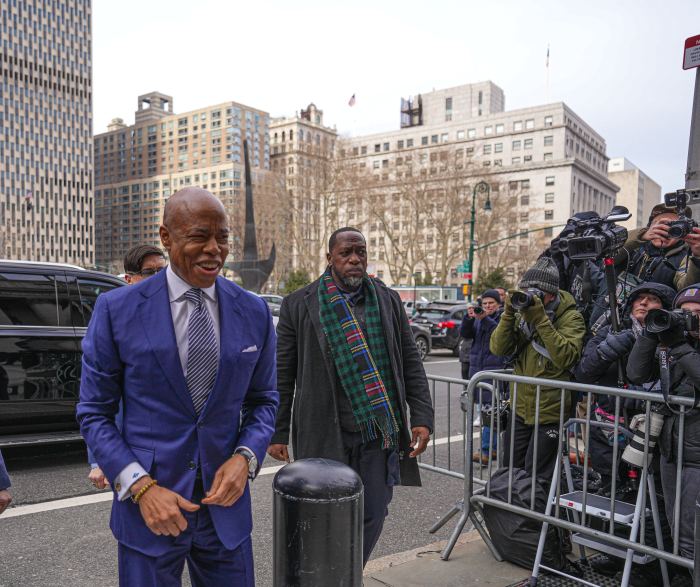Following the bombshell revelations that Republican Congress Member-elect George Santos fabricated many parts of his résumé, Democratic Congress Member Ritchie Torres announced late Thursday that he’s introducing a bill that would require those running for office to disclose key parts of their personal biography under oath.
Torres, who represents the northwest Bronx, revealed his intention to introduce the legislation, dubbed the “Stopping Another Non-Truthful Office Seeker Act” or the “SANTOS Act” – late Thursday night on Twitter. The bill would stipulate that those filing to run for Congress must disclose their educational background, employment history and any record of military service under oath along with their statement of candidacy.
They would face a penalty of perjury for lying about any of those areas, Torres told amNewYork Metro in an interview.
“I find it outrageous that a fraudulent candidate like George Santos can blatantly lie to voters about his qualifications with impunity,” Torres said. “And so, I’m introducing the SANTOS Act, which would require federal candidates to disclose in writing, under oath, under the penalty of perjury, their educational, employment and military history so that candidates who lie to voters can be punished.”
“Disclosure with voters to compare what a candidate has said under oath versus what a candidate has said on the campaign trail,” he added. “It would enable the detection of lies and the exposing and punishing of the candidates who tell those lies.”

Torres introduced the bill Friday but will have to reintroduce it next week, once the new Congress is sworn in.
The bill is named for Santos following a report from The New York Times last week that revealed he lied about graduating from Baruch College and attending New York University (NYU), working for Goldman Sachs and Citigroup and being Jewish during his bid to represent the Third Congressional District – which covers northeast Queens and northern Nassau County – this year.
Numerous news reports have also called into question the sources of Santos’ personal wealth; he has reported earning millions of dollars from his company the Devolder Organization, but didn’t list any clients for the firm in campaign finance reports. In September, Santos reported that he lent his campaign a $700,000 sum from his personal funds – he listed his Devolder salary at $750,000-a-year – making up a sizable portion of his over $3 million campaign war chest.
Both local and federal prosecutors, including Republican Nassau County District Attorney Anne Donnelly’s office and the U.S. Attorney in the Eastern District of New York, announced they’ve launched investigations into Santos for any crimes he may have committed on the campaign trail since his deceptions were revealed last week.
Torres said his bill would simply “expand” current Congressional disclosure requirements to include information about a candidate’s education, employment and military records. He said he zeroed in on those three areas because they’re far easier to fact check than questions about a candidate’s identity, like their sexual orientation or religion, would be.
“I chose those three categories because of their objectivity, and their relevance to qualifications,” Torres said. “Notice that I make no mention of identity, because that’s much more of a gray area. That’s much more subjective.”
For instance “if a candidate claims to have been a student at NYU, it’s a demonstrable fact,” he said. “You can easily call NYU. How do you prove whether a candidate is actually gay? So I steer clear of, you know, the messiness surrounding claims of identity.”
While Republicans will control the majority in Congress starting in the new year, Torres said he’s “optimistic” about the bill’s chances, considering some members of the GOP have publicly condemned Santos and the party’s leadership hasn’t rushed to his defense.
“There is a path to passage even in a Republican controlled House, because what the possible case can you make against telling the truth to voters?” Torres said.
Although he hasn’t yet seen the bill, election lawyer Jerry Goldfeder said he’s skeptical of whether it’s constitutional.
“The United States Constitution has three qualifications to be a member of Congress and the states and Congress can add requirements for candidates as long as those are not impacted,” Goldfeder said. “I look forward to looking at Ritchie’s proposed legislation.”
Torres, however, said considering individuals and institutions have to make disclosures to the government all the time, he doesn’t see what constitutional issue there is with the bill.
“If disclosure is unconstitutional, then that would cause a collapse of entire areas of law, like federal election law,” he said. “There’s no First Amendment right to perjure yourself.”



































